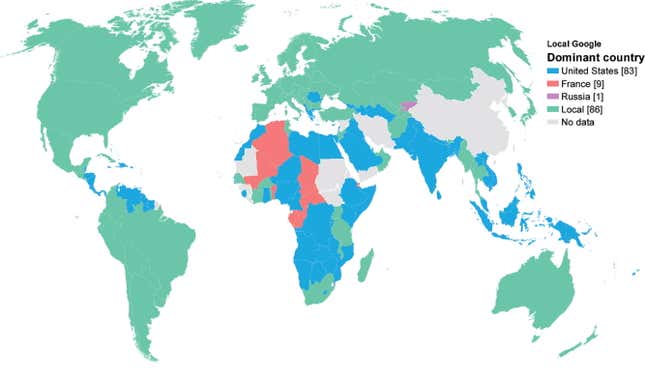A Google search for “Accra,” the capital of Ghana, returns its Wikipedia entry, travel advice from Lonely Planet and TripAdvisor, and a few news websites like the Guardian. Almost none of the search results come from pages hosted in Ghana, and though results come from six different countries, five of them are in the global north, as opposed to in Africa.
Only eight countries in Africa have a majority of content that is locally produced. Most content comes from the United States and to a lesser extent, France, according to a new study published in the Annals of the American Association of Geographers. In Africa, only South Africa and Madagascar ranked high in terms of local content. Even capitals or large cities like Lagos see little local content in Google search results.
“This gives rise to a form of digital hegemony, whereby producers in a few countries get to define what is read by others,” researchers Andrea Ballatore, Mark Graham, and Shilad Sen concluded. They analyzed more than 33,000 Google search results for 188 capital cities and found that the US accounted for over half of the first page of results for 61 countries.

Early advocates of the internet’s democratizing power believed it would give people more of a voice about their own communities and countries. Instead, it appears to be reinforcing digital divides between wealthier and better connected countries and poorer, less developed countries.
This matters, the researchers argue, because the ways that cities and countries are represented digitally increasingly shapes how people, including those that live there, understand and reproduce those places. “Until the lion learns how to write, every story will glorify the hunter,” the authors quote a Ghanaian proverb.
Part of this is commercial. Africa accounts for only 3% of global internet traffic, and most websites Africans visit are hosted overseas—one reason why sites in Africa are often slower to load. The researchers also found that the presence of a strong publishing industry and scientific research were strong predictors for more local content.
